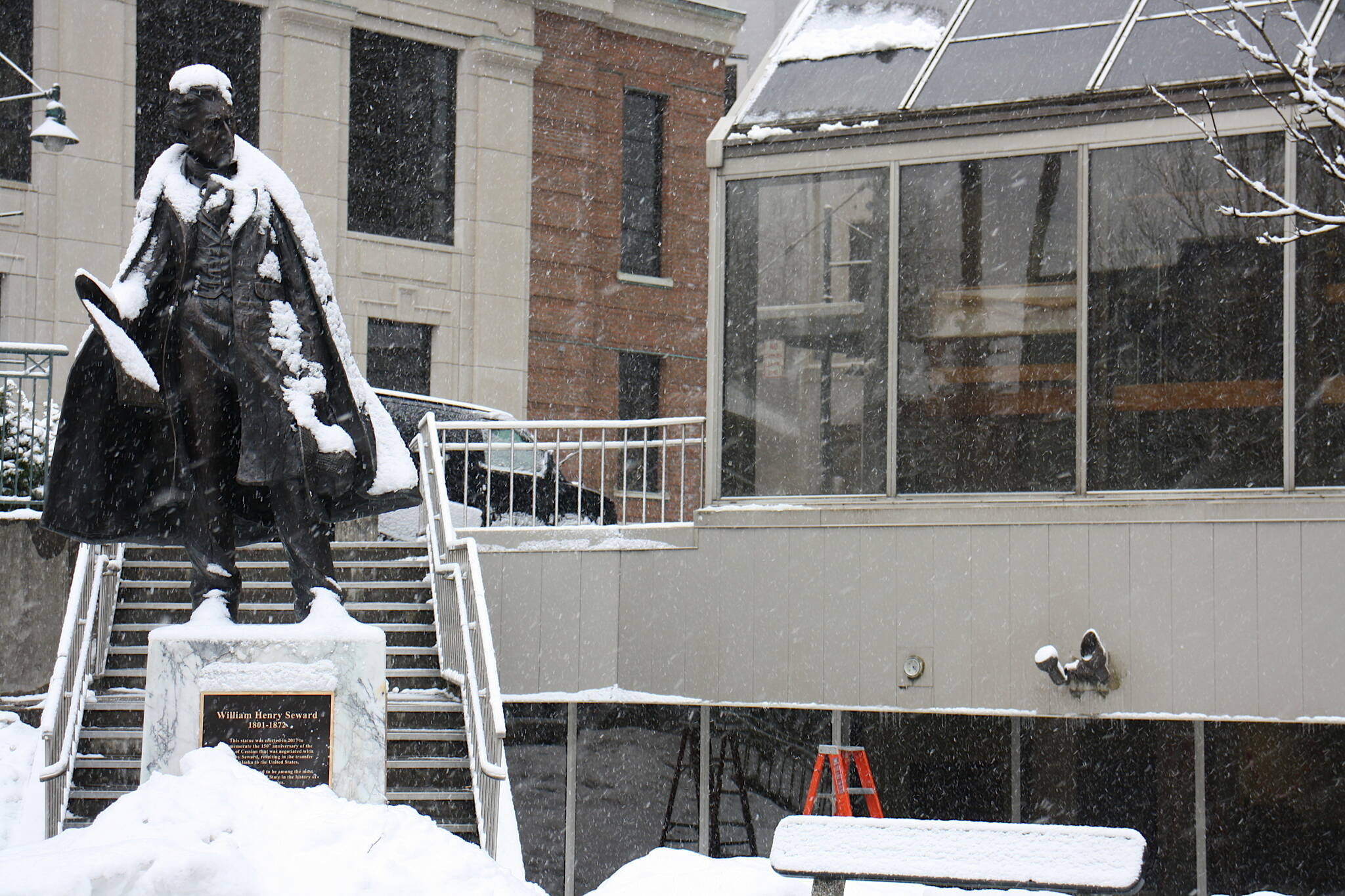Plans to stage a courthouse sit-in until rules for Alaska’s grand juries are changed encountered something of a whiteout in Juneau on Wednesday, with no protesters showing up during a multi-hour snowstorm as their peers gathered at several other locations around the state.
But people objecting to what they call recent and unconstitutional restrictions on grand juries to investigate corrupt public officials did get a promise of sorts from a sympathetic lawmaker in the Alaska State Capitol across the street from Juneau’s courthouse, who said the issue will be raised in some form this session.
Organizers of the sit-ins claim a Kenai grand jury investigating corruption of judges for the past eight months is being denied its proper investigative powers due to two rule changes by Alaska Supreme Court since December. Similar claims have been made involving at least two other jurisdictions, including Juneau.
The protesters claim citizens have the right to directly bring issues before grand juries for investigation. The Alaska Court System, in a recently published FAQ about the issue, states that’s not the case — citizens can present requests to the Department of Law, whose attorneys determine if grand jury attention is warranted — and the rule changes were to clarify points on that matter.
“The Alaska Constitution gives grand juries the right to investigate and make recommendations concerning the public welfare or safety; it does not provide that a citizen has a right to have a grand jury investigate a matter that the citizen thinks is important,” the FAQ states. “Alaskan citizens have never had a constitutional right to bring any issue directly to a grand jury for investigation.”
The rule changes were because “there was no process for how citizen requests should be handled,” because it wasn’t a consideration until last year when “three citizens in three court locations before three different judges asked for issues to be investigated by a grand jury,” according to the FAQ.
Notices advertising the sit-in and offering guidance to participants said the purpose was to gather outside for a publicly visible protest, and also enter the courthouse to present material for investigations to grand jury members who typically meet Wednesdays. Participants were told to document and record video of all interactions inside courthouses, including arrests, if possible.
“We need to have the public aware that our grand juries are totally independent and a body that can investigate any allegations of corruption in government and that they’re free to do that,” David Haeg, an organizer of the statewide protests, said outside Kenai Courthouse on Wednesday.
At least three people, including Haeg, brought documents to the Kenai Courthouse they wished to present directly to a grand jury. Demonstrators were directed by courthouse staff to present information to the office of the district attorney’s office, protesters later said was not available. Reports indicate between 20 to 30 people showed up at Anchorage Nesbitt Courthouse and about 10 at the courthouse in Palmer.
Despite the vows in the organizers’ notices for the sit-ins to continue “until the Alaska Supreme Court’s recent unconstitutional suspension of grand jury powers is rescinded,” the demonstrations were a day-long event.
Security and supervisory officials at the Juneau courthouse said shortly after 8 a.m. they were unaware of the planned sit-in, but a notice was sent the day before to employees reminding them of a policy banning photography of court-related activities without official permission. The precaution turned out to be unnecessary, as only one protester said she showed up briefly before noon and left when she saw no other participants.
Also showing up at the Juneau courthouse earlier during the morning was Tony Tengs, a Juneau resident who said he’s a friend of people who planned to protest and wanted to see if it was taking place locally as planned. He said that while the primary issues of the dispute date back to last year and have gotten responses from the Alaska Court System and some public officials, the hope of protesters is that greater public awareness might help lead to “impeachment, investigation or maybe a resolution where we say this can’t happen any more.”
“It is a start,” he said. “Maybe it gives people a rallying point…Once they learn more maybe this is the first baby step.”
The dispute is getting attention from policymakers, most notably from the Kenai Peninsula Borough Assembly which on Tuesday passed a resolution calling for an investigation by the Legislature.
“Grand juries have been denied their investigative powers; and, there has been public official misconduct and/or falsifying of official records,” the resolution introduced by Kenai Assembly members Bill Elam and Cindy Ecklund asserts. “The allegations are serious, involve constitutional rights, and merit Legislative hearings to gather evidence in a public forum. It is in the best interest of the State to provide a transparent process and Legislative oversight pursuant to the provisions of the Alaska Constitution.”
No bills related to the issue have been introduced and no hearing held during this year’s legislative session, said Rep. Ben Carpenter, a Nikiski Republican who has taken similar stances on the grand jury issue as Wednesday’s protesters and the Kenai Assembly. He said there is an intention to bring the issue up this session, but “we want to make sure we have our ducks in a row when we have this conversation.”
“It is a constitutional crisis because there is an interpretation issue with the Supreme Court about what grand jury authority is,” he said.
• Contact Mark Sabbatini at mark.sabbatini@juneauempire.com. Peninsula Clarion reporter Ashlyn O’Hara contributed reporting to this article. O’Hara can be contacted at ashlyn.ohara@peninsulaclarion.com.

